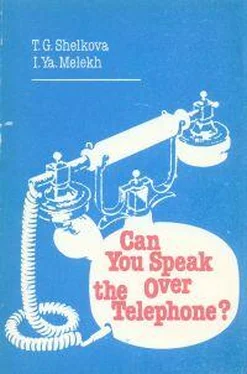Charles: Sounds too good to be true [74] too good to be true : a fixed phrase (так хорошо, что и не верится; невероятно)
. Expensive?
Joan: Rather. But still the prices were a bit lower than in any of the other adverts I’ve seen, and yet the facilities were as good or even better. You know, even allowing for [75] allowing for : taking into account
a bit of exaggeration in the advert, it seemed to have a lot to offer [76] a lot to offer : a fixed phrase often used for referring to something which has a number of desirable features
.
Charles: Had it?
Joan: Oh, yes. And the food is good — according to the advert, again — but they’re bound to say that.
Charles: Of course. The only way to find out for certain is to go and try it. And that’s taking rather a risk. I tell you what [77] I tell you what : a colloquial way of introducing a suggestion
, though. It’s just occurred to me — Mr and Mrs Croft from over the road [78] from over the road : the equivalent in less idiomatic English would be “who live on the other side of the road”
have been to that part of England several times, and I seem to remember them saying they always use the same hotel.
Joan: Do they?
Charles: Yes. At least I think that’s what they said. I’ll pop around [79] pop around : pop into
later this evening, and if they do know anything that might be of use to you I’ll get one or the other of them to give you a ring.
Joan: Would you? That’s very kind of you. They won’t mind, will they?
Charles: No, of course not. I’m sure they’ll be pleased to help.
Joan: Well, that’s marvellous.
Charles: Did you say something about taking the car?
Joan: Yes. It takes a little longer. But there is no need to rush, because Doug’s got an extra week’s holiday this year.
Charles: Lucky Doug. But isn’t it rather a long drive from Edinburgh — what with the children and the holiday traffic [80] what with the children and the holiday traffic : the sense here is that “because of the children and the holiday traffic” the length of the drive will be a problem. This use of “what with” to mean something like “because of, in view of is quite common in conversational English; e.g. “What with doing the housework and the shopping, I never have a moment to spare”.
?
Joan: Well, strange as it may seem, the kids are very good in the car. And if you go by train or air you don’t see much on the way, you’re sort of insulated from all the lovely places you’re passing.
Charles: Yes, I agree with you.
Joan: But I’m sure you must have better things to do than listen to me rattling on [81] rattling on : colloquial for “chattering”
.
Charles: Oh, that’s all right. It’s nice to hear from you. But I will drop in on the Crofts and ask them to phone you. Don’t expect to hear anything until after nine, though, because they’re usually out on Sunday until some time in the evening.
Joan: Well, I shall be around [82] around : at home; “around the house” meaning “in the house”
whatever time they ring. Busy getting things ready for school tomorrow. And thanks again, Charles. It really is very kind of you to go to all this trouble.
Charles: No trouble at all. Only too glad [83] only too glad : an expressive way of saying “glad”
to help if I can.
Joan: Well, thanks anyway. Bye-bye, Charles.
Charles: Bye for now, Joan.
2. A Letter of Application
Joe: Peatley two-seven-one [84] Peatley two-seven-one : although more and more telephone exchanges in Britain are being converted to all-figure numbers, some are still identified by a name
.
Bob: Hello, is that you, Joe?
Joe: Yes.
Bob: Bob here. How’s things? [85] How’s things : a colloquial variant of “How are you”
Joe: Oh, hello, Bob. Fine. How are you?
Bob: О. K. Listen, I’ve decided to apply for that job I was telling you about. You remember?
Joe: Yes. I remember. Croydon [86] Croydon : a suburb of London
, wasn’t it? What was it, a car factory?
Bob: No, light engineering. Rather like that place I was at in Leeds.
Joe: Oh yes, of course. Light engineering. I remember now. And it was for a manager, wasn’t it.
Bob: Yes. Personnel Manager.
Joe: Very nice too. Do you feel optimistic about it?
Bob: Well, I wouldn’t say I exactly feel optimistic, but at least my training and experience have put me in with a chance [87] put me in with a chance : given me a chance
. So perhaps I could say I feel reasonably optimistic about getting short-listed [88] short-listed : placed on the “short list” of people who are selected from all the other applicants and given an interview.
. But the interview — that’s different.
Joe: Why, for goodness sake? [89] for goodness sake : a mild exclamation often used to express varying degrees of exasperation
You’re not scared of interviews, are you?
Bob: No, I’m not scared of them, but I don’t feel at my best in interviews. Not when I’m on the receiving end [90] on the receiving end : in the position of receiving something
, that is. I suppose I spend so much of my time interviewing other people that I feel off balance when I’m in the hot seat [91] in the hot seat : a colloquial metaphor used of any uncomfortable situation
myself.
Joe: Oh, I shoudn’t worry too much about it if I were you [92] I shouldn’t worry too much about it if I were you : this sentence, or something very much like it, is used so often in these circumstances that it amounts almost to a fixed phrase
. As you say, the job is absolutely made for you. I shoudn’t think they’ll get many applicants with your qualifications [93] with your qualifications : the sense is that there are unlikely to be many applicants “with such good qualifications”, rather than “with the same qualifications”
.
Bob: Well, we’ll see [94] we’ll see : we’ll see eventually what happens. Often used as a way of expressing doubt about the
.
Joe: Yes. You’re bound to get an interview. What’s the pay like incidentally?
Bob: Oh, the pay’s good. Nearly twice what I’m getting now. Joe: Mm!
Bob: But then it is in London, and the rates tend to be a lot higher there, anyway.
Joe: Yes, but even so, it’ll make a big difference if you get it. You’ll be loaded [95] loaded : loaded with money — a colloquialism
!
Bob: Well, I don’t know about [96] I don’t know about : a standard phrase for expressing doubt about whatever it introduces
loaded. I should need a damned sight more than twice my present wages to be loaded.
outcome of something.
Joe: Was the money the main reason for applying?
Bob: One of the reasons. Probably, not the main reason.
Joe: What was that then?
Bob: Well, I don’t know, it’s just that I… well, I like working at Yorkshire Engineering, but I’d like more scope [97] scope : opportunity
for putting a few ideas into practice. You know, old Billings [98] old Billings : a common informal way of referring to people, especially men. The adjective “old” does not necessarily carry its normal sense, and it’s use in this way often implies a measure of affection.
is all right, he’s very understanding and pleasant to work for and all that.
Читать дальше












